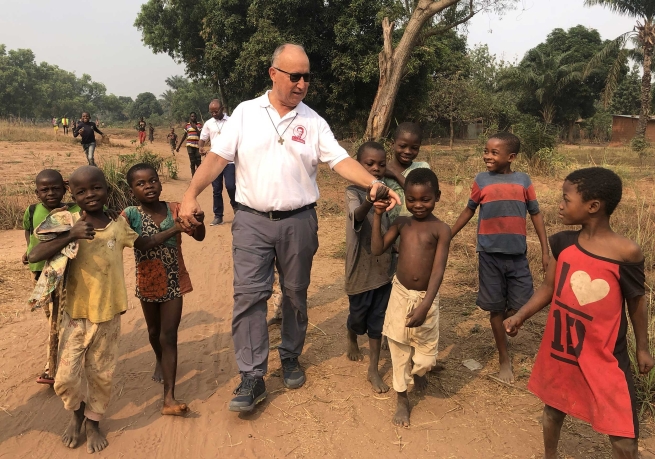"Going to Congo and encountering that naked poverty, looking at the many needy, will do us good as well. And also it will make the world know that situation, which even I did not know before my trip to Africa last summer, which for me also meant saying thank you to the life that has given me so much," continues the Salesian, who still uses the term "reinforced" several times, with that typical accent that is then the same as Pope Francis: "Yes, I’m also from Argentina; in December I was also in the Vatican to meet the Pope. He knows what we bring forward in the Congo."
A presence, that of the Salesians in the Democratic Republic of Congo, which dates back to 1911, when the Sons of Don Bosco founded the first mission, immediately dedicating themselves to the education of children, while today, Fr. Antúnez recounts, "we have a variety of missionary commitments, from oratories to parishes, from social groups to the cultivation of vegetable gardens. And always, I would like to emphasize, in villages where the poorest people live. For us, these are the recipients of the missions, always in the spirit of Don Bosco. My confreres could also have made another choice, to go elsewhere, but they chose the neediest, the extreme poverty. And when I went to the Congo, I had the opportunity to touch with my own hands that poverty that cannot even be described."
That is why the President of "Missioni Don Bosco" points out, it is urgent to respond to so many needs, starting with those of the children: "Now for example we are building another school because so many do not have an education. Of course, they will have to walk many kilometers to get there, but at least they will have a chance. Because we can give them food, clothes, and medicine as we actually do, but we are educators, with the specific choice, as I said before, to live among them."
On his trip to Africa, one of the realities of extreme poverty he touched upon was in Mbuji Mayi: "There are 4 million poor people there and only 20 percent have water and light. I saw people walking in the dark all the time. There you don't need to be thinking about who knows what: you have to feed those children, bring them water."
At that mission he met Fr. Mario Pérez, a Venezuelan who has been in the Democratic Republic of Congo for more than 40 years and who closely follows cases of children's rights violations, particularly the phenomenon of "witch children"- often orphans, disabled, albinos who are accused of witchcraft. Children forced to leave their homes and live on the streets. The Salesians frequent the streets on a daily basis in order to make contact with them and convince them to accompany them to the protection and shelter center where they can guarantee the chidren medical care and food. In a second step, they try to integrate them into education, which is in addition to days dedicated to sharing and playing with the other children taken in.
And then there are the women, the mothers: "Their situation is dire; we help them by giving them the opportunity to grow gardens, so they feed their children and can sell something at the market." For girls and mothers in need, the Salesians also run vocational training programs, and in recent months as many as 166 young people have graduated as seamstresses, hairdressers, and cooks.
But the overall situation remains disastrous, to say the least, even from a health point of view: Covid-19, Ebola that periodically resurfaces, and malaria that in Congo still causes more deaths than other diseases.
A picture to which the Salesians do not retreat an inch, indeed, to which they respond by intensifying their missionary effort, such as in territories where the exploitation of minors in the mines still exists.
"Our missionaries," Fr. Antúnez takes up the concept dear to him, "are convinced of what they do and how they do it. Of course, there is also a feeling of helplessness and a great concern for the survival of so many children, so many poor people. But we look to the future. And our future is strengthened by so many benefactors around the world. But now it will be especially so by the sight of Pope Francis, a great missionary pontiff, who is walking along the same track as us."


